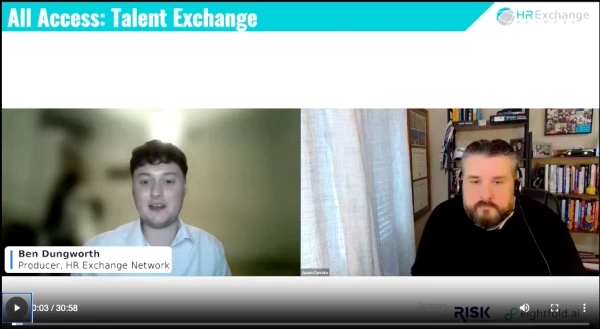
Compensation and benefits are among the biggest drivers for attracting top talent. Like everything else, however, compensation has dramatically evolved since the start of the pandemic. The changes keep coming, so HR leaders have to keep up with the trends that are likely to surface well into 2022.
Recently, Kaitlyn Knopp, CEO and Cofounder of Pequity, a compensation workflow platform focused on helping clients make better pay decisions with parity in mind, spoke in the session, Compensation in a Remote World, at the HR Exchange Network's Fourth Annual Talent Exchange Live 2021 online event.
The movement to work from anywhere and the migration away from big cities to smaller towns have put a wrench in the plans and strategy of compensation managers. In this new world, HR leaders are grappling with challenges like quickly changing market data, new talent competition because of remote work, calculating differences in geography when determining fair compensation, and uncertainty about what to do. In a poll, nearly 42% of the session's participants said the task of keeping up with market data is the hardest part of managing the compensation of remote workers.
Everything in HR is changing at lightning speed, so Knopp dove into the trends that will be continuing well into 2022 and beyond.
Higher Pay in Notoriously Expensive Regions
Not surprisingly, areas around New York City and the Bay Area in California, are seeing increased compensation as people relocate and work remotely. Knopp reported that Pequity's data shows a 5% to 7% increase of the median total compensation over the past year in the region near NYC, including New York, New Jersey, Connecticut, and Delaware.
Arrival of Front-Loading Vesting
Larger public tech companies are now competing for talent with startups, which are often flush with cash. To gain an edge, companies like Google and Uber, have responded by front-loading vesting. This means they offer equity and remove the one-year cliff to become more competitive in the first year without changing their grant size.
"When we interview a person, we're not always certain what their performance will be. What we want to do is issue them something to get them in the door and give us that real world experience of how they are performing with a team," says Knopp. "So, at the end of the period, we can differentiate them with either a higher grant or we can lower the grant accordingly to make sure we're not issuing larger new hire grants to strong negotiators."
Mass Exodus of Expensive Cities
You might have heard about how expensive living and working in San Francisco can be. So, you might not be surprised to learn that hiring in San Francisco dropped 26% since February 2021 with an average month-over-month decrease of 15%, according to Pequity's proprietary anonymized compensation data. The largest drops, so far, came in July and August.
"This has caught a lot of people's attention because it was also known as a mecca for talent," says Knopp.
Despite the exodus, the median total compensation in the Bay Area is up 7% to 9%. Even though people are moving away from the more expensive cities now that they can work remotely, compensation continues to rise. This increase is probably driven by a desire to adapt to remote work and offer some sort of incentive to get top talent to stay in places like San Francisco, says Knopp.
Geo-Based Pay Is Here to Stay
Geo-based or location-based pay is based on the idea that people should earn similar pay that takes into consideration local tax rates and cost of living. As companies reckon with the challenge of either keeping a bricks-and-mortar office and the associated costs or transitioning to a fully remote operation, this kind of pay structure remains a hot topic. It also allows companies to be equitable in their pay, says Knopp. She expects this pay structure to continue to gain ground. In fact, about 80% of Pequity's customers utilize a geo-based pay system to ensure equity among workers.
New Normal for Compensation
HR leaders have to respond to what's happening swiftly. In the Great Resignation or Great Reshuffling, employers must:
- Compare market data against internal pay decisions more continuously than ever before because everything is changing so quickly
- Make faster decisions on offers and competing situations or risk losing top talent to others
- Be transparent about pay decisions and structures, so people can make thoughtful and fair judgments about their careers and finances
- Proactively monitor and take preventative measures to avoid pay disparity among groups that might favor remote work (for example, many women who are notoriously underrepresented and underpaid are working remotely more now and could end up earning even less)
"To stay competitive, companies require integrations, permissioning, and cross-decision analytics, all with pay parity in mind," says Knopp.
Another big challenge is going to be training supervisors to talk about compensation intelligently and in a way that recruits and employees can understand. More than 40% of the session's participants said they were not at all confident that recruiters and managers in their organization know how to tackle questions about compensation from candidates and employees.
Having answers to questions is a necessity in uncertain times. The pandemic is continuing to cause anxiety, which is meaningful for compensation managers and other HR leaders, says Knopp.
"This isn't over yet. We have a lot of companies trying to make finite decisions. We're all exhausted. We would all like to to say, 'This is the date we're going to return to work or go fully remote or this is going to be our pay philosophy,'" says Knopp. "It is like any other decision. You will keep adapting with the pandemic. Inflation is not over. Google just announced it is not going to return to the office in 2022. Being able to create a philosophy that keeps you nimble and putting in systems that help you will be the best thing to invest in for your team."
Photo by Karolina Grabowska for Pexels




























